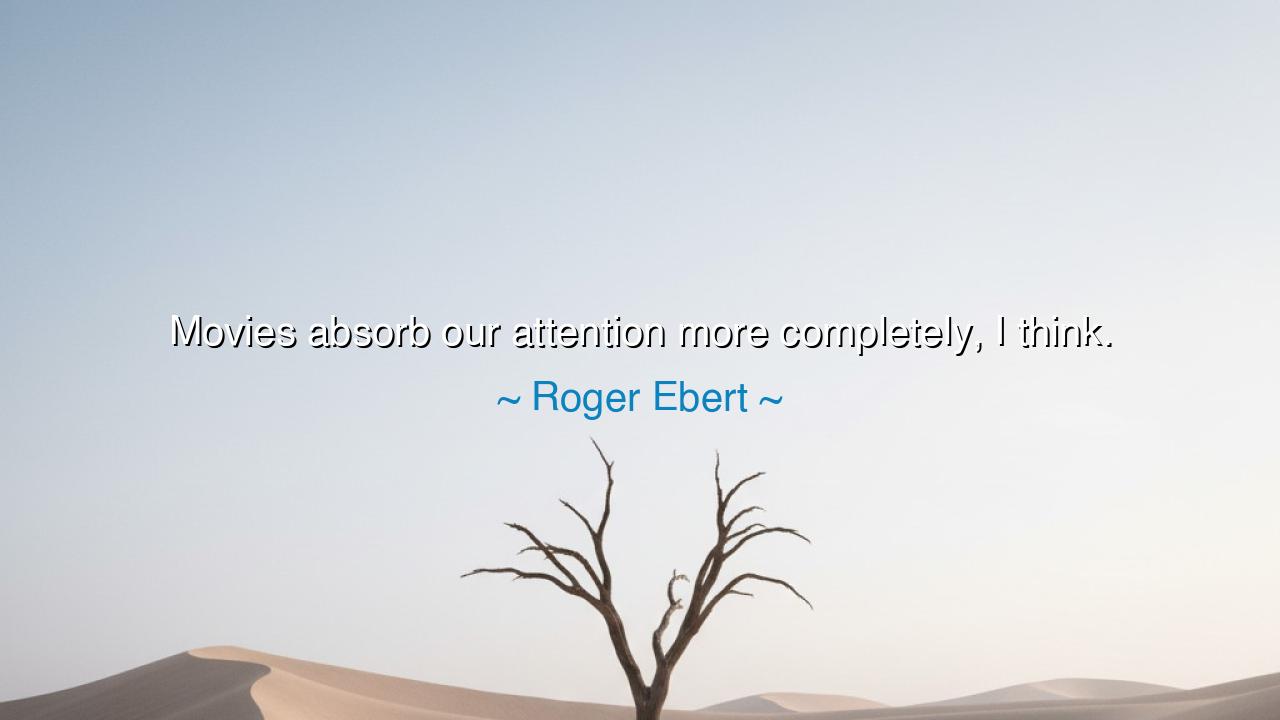
Movies absorb our attention more completely, I think.






In the grand theater of human existence, there are few experiences more captivating than the ability of a story to absorb our attention. Roger Ebert, in his reflection on the nature of cinema, offers a profound truth when he says, "Movies absorb our attention more completely, I think." These words speak to the power of film—a modern form of storytelling that has the unique ability to draw us into its world in a way that other forms of art sometimes cannot. It is not just the plot or the images on the screen that capture our focus, but the immersive experience that film offers, a total engagement of the senses and emotions. Ebert’s statement reminds us of the ancient power of storytelling, an art that has been used for millennia to captivate the hearts and minds of those who seek to be transported into another world.
In the ancient world, there was no more sacred or transformative experience than the telling of a great story. The Greek tragedies of Sophocles and Aeschylus, performed in the grand amphitheaters, had the power to absorb the attention of an entire city. The ancient audience was not merely watching a performance—they were participating in the drama. Oedipus and Antigone, for example, were not just characters on stage, but reflections of the human condition. The audience's attention was absorbed by the moral and emotional dilemmas posed, and in the collective experience of watching the play, they were transformed. Much like today’s movies, these performances were not simply distractions—they were powerful mediums through which the deepest aspects of life were explored, understood, and felt.
What makes film so uniquely absorbing, much like the ancient plays, is its ability to engage us on every level—visually, emotionally, and intellectually. When watching a movie, we are not just observing; we are being drawn into the world the director has created. We experience the characters' struggles and triumphs as if they were our own. It is a forceful form of art—not passive, but active in its ability to transform us. Think of the heroic journey of Odysseus as he navigates the treacherous seas and encounters gods, monsters, and temptations. The ancient listeners, much like today's moviegoers, were not merely hearing a tale—they were feeling the tension in their own bones, immersed in the journey of the hero. In this way, movies serve as a modern extension of that ancient tradition, where audiences are not simply observers but participants in the story being told.
The engagement that Ebert speaks of is also evident in the modern world through the emotional power of cinema. Much like the epic stories of the ancients, modern films have the ability to carry us beyond the realm of the everyday and into the depths of human emotion. A film like Schindler’s List, for example, is not just a recounting of history—it is an immersive experience that demands a total emotional response from the viewer. The visual power of the images, the sorrow and triumph of the characters, and the moral questions posed by the story absorb us entirely. As Ebert notes, the nature of film is such that it draws in our attention in a way that transcends mere intellectual engagement and touches the very core of our being.
In this sense, movies are a modern form of ritual—not unlike the ancient storytelling practices that held power in sacred spaces. The ancient oracle of Delphi, for instance, absorbed the attention of those who came seeking wisdom, not through facts, but through the mysterious and captivating experience of the ritual itself. Film works in a similar way—it holds us in its grip, drawing us into its world, and leaving us changed in the process. Ebert’s insight into the absorbing nature of film speaks to its power as a modern ritual—an experience that transcends time and space, taking us into a world where the boundaries of reality are suspended, and where the deeper truths of the human condition can be explored in ways that are both powerful and transformative.
The lesson we learn from Ebert’s observation is this: art, in all its forms, has the power to absorb our attention, to take us beyond ourselves, and to transform us. Movies, much like the epic tales of the ancients, are not merely a form of entertainment, but a way to engage with the deepest questions of life, identity, and purpose. Through film, we are given the opportunity to reflect on who we are, who we could become, and what it means to be human. As audiences, we must recognize the power of art to shape us—not just as passive receivers, but as active participants in the stories that unfold before us.
As you move through the world, remember the power of art to absorb your attention and transform your perspective. Whether through film, literature, or the performing arts, allow yourself to be drawn into the stories that challenge you, that make you feel, and that call you to reflect on the deeper truths of your own life. Engage fully with the world of art, knowing that it has the power not just to entertain, but to shape you. Just as the ancient Greeks watched their plays with full attention, ready to be changed by what they saw, so too should we approach movies with an open heart and mind, ready to be transformed by the stories that captivate us.






AAdministratorAdministrator
Welcome, honored guests. Please leave a comment, we will respond soon